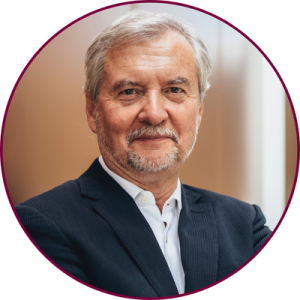This article was first published on Brighter World. Read the original article.

A trailblazing brain health assessment technology developed at McMaster is continuing to grow in its applications following new partnerships with Boston University and the Canadian Armed Forces.
VoxNeuro is a healthtech company co-founded in 2017 by John Connolly, a professor emeritus specializing in clinical and cognitive neuroscience, with appointments in the Faculty of Engineering, Science and Health Sciences, and the former Senator William McMaster Chair in Cognitive Neuroscience.
Through electroencephalography (EEG) technology coupled with VoxNeuro’s software, the Cognitive Health Assessment Management Platform (CHAMP), Connolly, now VoxNeuro’s chief science officer, and his team offer clinicians a way to perform objective brain health assessments — a game-changing advancement when it comes to diagnosing and developing treatment plans for patients with brain injuries resulting in cognitive dysfunction such as memory loss.
Clinical Studies with Boston University and the Canadian Armed Forces
With CHAMP approved by Health Canada as well as the American Food and Drug Administration (FDA) last year, the company is keen to expand the applications of their technology and is currently engaging in new clinical studies.
VoxNeuro has launched two studies with Boston University that will evaluate how their technology can be used to assess diagnostic accuracy in patients suffering from mild-traumatic brain injury/concussion and Alzheimer’s disease.

Alzheimer’s disease affects millions of people annually, and clinicians currently diagnose this disease using behaviour-based screening methods.
By using brain-based biomarkers made possible by VoxNeuro technology, clinicians will be able to make diagnoses more quickly and develop more accurate treatment plans as a result.
Connolly and his team have also partnered with the Canadian Armed Forces (CAF) to study cognitive issues that veterans and active military personnel experience.
This study will focus on the cognitive effects following intense military training regimens designed to reflect a combat environment and blast exposure. The CAF personnel who are part of this training will undergo VoxNeuro’s cognitive testing before and after the training.
Through this study and the Boston University project, Connolly hopes to better understand the relationship between exposure to repetitive sub-concussive exposure — such as hits to the head — and behavioural symptoms, vestibular dysfunction, neurophysiology, and cognition to aid in early detection, treatment, prevention and prognosis.
Both studies will also give researchers an opportunity to objectively track cognitive changes in injured brains over time, including how they respond to treatments.
Giving the brain a voice
Developing a more accurate way of assessing brain health was the driving force behind Connolly’s research and is now the purpose of VoxNeuro.
VoxNeuro’s approach uses scientifically-based brain biomarkers to learn what is happening in the brain. This data paints a clear picture and eliminates the need to rely on behavioural assessments alone.
“Ultimately, what we are able to deliver through this process is an objective measure of an individual’s cognitive function in three key domains: attention and concentration, information processing and memory,” says Connolly.
Traditionally, when a clinician assesses someone who has a potential brain injury or is experiencing memory loss, they rely on behavioural assessments.
They may verbally survey a patient, ask them to do certain writing or drawing exercises or ask them to rate the severity of their symptoms.
The trouble with using subjective methods like these is they leave room for error.
“I think one of the most important aspects of what we do is to provide objective measures of cognitive function rather than subjective opinion of the patient as to their well-being,” says Connolly.
Even when relying on a highly skilled clinician who uses experience and knowledge to make judgments about the state of a patient, assessments are frequently inaccurate.
“Using subjective methods of assessment have been known to be wrong up to 43 per cent of the time in assessing patients diagnosed with unresponsive wakefulness syndrome (preciously known as vegetative state),” Connolly notes.
From a patient perspective, the form of assessment is also less invasive than traditional methods. The person undergoing the assessment does a series of neuropsychological tests on a computer while EEG electrodes sit on their scalp and measure their brain’s electrical activity through conductive gel, similar to an ultrasound, and the process takes under an hour — far less time than traditional methods typically take.
With technology that took shape while working with the McMaster Industry Liaison Office (MILO) and McMaster’s business incubator The Forge, Connolly is thrilled that his decades of research on cognitive health measurements are now translating into real world impact.
“The truth is, I’m excited by absolutely everything that’s happening,” says Connolly. “There is not much one does without using one’s brain.”